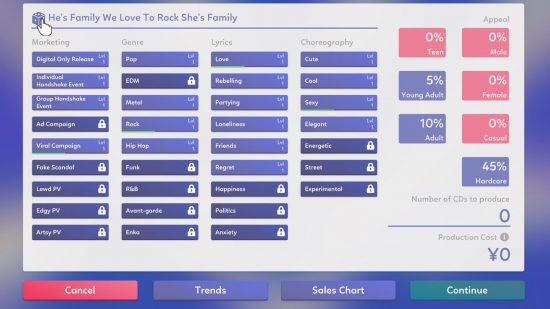Our Verdict
Idol Manager is a fascinating, tongue-in-cheek business sim with well-written visual novel aspects and plenty of scandals. It’s not for everyone, but for the right audience it’s a brilliantly crafted little gem that prods at the dark, seedy side of the idol scene, and challenges you with some tricky moral scenarios.
I’m a simple gal – I see cute waifus or husbandos, and I’m sold, which is exactly what pulled me into Idol Manager. But, boy oh boy, a cute little dating sim with a predictable anime plot this is not.
This surprisingly complex, dark management sim slash visual novel had me smacking my face into the desk, nearly made me throw my Switch at a wall, and left me lying awake at night, restlessly thinking about how I’m going to pay off my debts and stop my idols from doing the most ridiculous stuff, as that 30-second music loop played in my head over and over and over – and that’s what makes it so great.
Idol Manager has been out on other platforms for some time now, but I’d somehow managed to completely miss it. That is, until the Switch release, where it dropped into my lap like the scandalous little popstar it is. I’m both happy and infuriated about the amount of hours I’ve put into it so far, which, I believe, is exactly what the game wants. It’s sentient. It knows your thoughts. It knows your fears. It’s ready to prey on them.
You take to the helm of your new business as a fresh-faced producer (well, freshly faceless? You have a mouth and hair, that’s about it). You’re told that your sugar daddy producer, Fujimoto, doesn’t really care if you turn a profit, he basically just wants you to try not to go bankrupt as you fill the building with a somewhat legitimate business. Because, you know, all signs point to the fact that this building you’re now inhabiting used to be a brothel – no parallel with your new idol agency, of course.
If you’re familiar with the idol industry, you’re aware that it’s not as squeaky clean as the image it likes to portray. But, if you somehow stumbled across this game without knowing anything about it, don’t worry – Idol Manager is about to teach you, and it won’t pull any punches. Exploitation, abuse, scandal, and cutthroat practices are rife, and this game critiques, parodies, and pushes you to use these in order to get by, while also suggesting that conforming to industry standards isn’t always the best option – especially not morally.
Keeping that mind, we need need to highlight that this is a pretty heavy game, and should definitely be taken with a content warning. Though events are randomised and impacted by your decisions, some very distressing situations can arise, which could be upsetting for some players.
You can play Idol Manager in free mode or story mode. I highly recommend the latter, as the story is brilliantly written, and offers welcome breaks to the core, business sim gameplay, which otherwise can get a little monotonous. You’re also offered three difficulty modes. I implore you to heed the descriptions, avoid extreme mode, and enable the tutorial on your first playthrough, unless you’re an extreme masochist.
The business sim side is surprisingly detailed, and can feel a little overwhelming at first. Your main goals are to get fans, avoid scandals, and keep your idols at least somewhat happy so they can keep raking in that sweet, sweet cash for you. It’s very easy to bankrupt yourself at first, especially if you’re trying to be the good guy, sending your idols off to a spa every other day to keep their stamina up.
You get new idols through the auditioning process. This is essentially a gacha system, where you choose from a line-up of procedurally generated idols with randomised personalities, appearances, and stats. Each idol has their own goals, desires, and quirks – which can be positive or negative – so choosing the right ones is important. Your idols build relationships with you and each other, and can bully, gossip, or befriend each other, which all impacts their performances. You can also socialise with your idols, and even romance them, if that’s your jam. Just don’t expect them to always stay faithful, I’ve been burnt before.
Aside from idols, you also need other staff, including production assistants, choreographers, music producers, nurses, and stylists. Each of these little minions need their own office or studio, and play an important role in training your idols and creating content, as well as gathering the research points required to unlock new styles and promotion methods. They also, of course, each require a salary, taking their own cut of the budget.
From here, it’s a balancing game. Pump out content, hold events, do photoshoots, produce singles, and accumulate fame, all while keeping your idols and other staff happy and keeping your head above the profit line. It’s a little tough to get into the swing of things at first, but after a while it becomes natural. That doesn’t mean it’s simple, though – making tracks, throwing a concert, or getting an ad campaign up and running all take time, patience, and a hefty sprinkling of RNG. There are even certain promotional methods that are an expensive gamble, and can go horribly wrong. I’m looking at you, viral campaign.
When creating tracks, there’s a good chance you’ll fail if you don’t look at the trends and top charts first to take a peak at what’s popular. If the fans are jamming to a metal song about loneliness with elegant dance moves, throwing out an EDM track with happy lyrics and a cute dance style is less likely to pull in those bucks. I like this element, as the illusion of market research further pushes how taxing and fickle the idol industry is.
Idol Manager faces you with a lot of choices when it comes to your personal business practices and policies. Will you give the idols fair pay, or give them one yen and fire them if they complain? What’s your stance on your idols dating? Do you want your girls to wear shorts under their skirts to avoid salacious slip-ups, or leave it loose and see where the scandals take you?
Your policies dictate how your idols, employees, and fans see you, and also impact what type of scandals are brought to your door. These scandals offer very interesting predicaments, from your idols saying something inappropriate during a livestream to them getting caught having an affair with a politician. From there, it’s up to you how you handle it – do you stand by them, make a public apology, or give them the boot?
When it comes to the story, as mentioned above, I find it to be very well-written. There are certain requirements needed to unlock the next part of the narrative, which itself follows a set of story beats. Be it entering a talent competition, deciding whether to boycott a TV show, or trying to secure a leading spot at a huge sports event, your morals are truly tested. The dialogue in these sections is natural, and it’s hard not to find yourself invested in the social and business relationships between the characters.
Idol Manager has a great visual style, especially when it comes to the cutscene CGs, pixel sprites, and stylised building. The idol generation gets a little samey after a few pulls, as it’s clear there are only a few presets for each feature, and each of the other staff only has one sprite. A little more variety here would be nice, but it isn’t to the detriment of the overall vibe.
I mostly play in the Switch’s handheld mode, and find the text in the business sim elements to be a bit on the small side. Its performance has little to no hitches, but it took me a while to get used to the Switch controls. There’s no touch screen option, and moving your cursor around or using one of the myriad of multi-button ‘shortcuts’ feels cumbersome, though I got used to it after a while. I get the impression that the Switch version is hardly altered from the PC one, and feel a little more consideration of the Switch’s controls could have gone a long way to making the game more comfortable to control.
Despite the game’s theme, there’s very little variety of music in Idol Manager. The background music is light and poppy, and certainly well composed, but it’s a pretty short loop that you’ll listen to a lot throughout your playtime. And I mean a lot. After a while, I couldn’t handle it any more, and had to mute my Switch. The cutscenes aren’t fully voice acted, but instead accompanied by grunts, giggles, and short Japanese phrases that lend a little life to them.
Overall, I both love and hate Idol Manager, in the best way possible. It’s a well thought out and challenging business sim, its dark elements work well, its story is great, and it displays a surprisingly poignant portrayal of the industry as a whole, as well as the seedy side that lurks below it. While gameplay can get a little tedious and the controls take some getting used to, it’s certainly a great experience for those of you interested in this subculture, business sim games, and visual novels. However, if you look at the gameplay screenshots or fire up the beginning and think ‘this isn’t for me’, trust me when I say it won’t be at twenty hours in, either.
Its gameplay mechanics are weirdly morish, the open options between being a good person and general human garbage add some great replayability and moral dilemmas, and it certainly achieves what it sets out to do. Idol Manager is a truly unique experience, which takes a touch of both sadism and masochism to get through, and I’m very happy (and annoyed) that I had the opportunity to spend some time with it.






